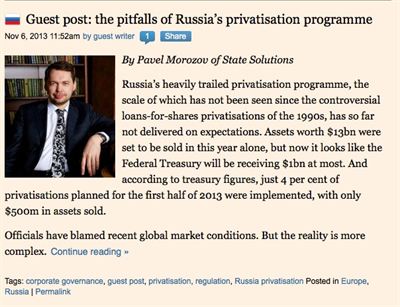FT beyondbrics: The pitfalls of Russia’s privatisation programme (by Pavel Morozov)

Russia’s heavily trailed privatisation programme, the scale of which has not been seen since the controversial loans-for-shares privatisations of the 1990s, has so far not delivered on expectations. Assets worth $13bn were set to be sold in this year alone, but now it looks like the Federal Treasury will be receiving $1bn at most. And according to treasury figures, just 4 per cent of privatisations planned for the first half of 2013 were implemented, with only $500m in assets sold.
Officials have blamed recent global market conditions. But the reality is more complex.
Launching a major privatisation plan during a market downturn is of course counter-intuitive. But the Russian markets have actually fallen by less than the MSCI emerging markets index. Russian stocks have traded on a multiple of four times forward earnings, compared with nine for the emerging markets as a whole, for some time. It seems likely that investors’ underwhelming appetite for taking stakes in Russia’s corporate crown jewels has as much to do with structural challenges such as transparency and the regulatory environment, as it has with broader macro-economic trends .
But with major stakes in state giants and key infrastructure companies up for grabs – including parts of VTB Bank, Russian Railways, Aeroflot, Rosneft, Sovcomflot, RusHydro, as well as Sheremetyevo and Vnukovo airports, all set to be sold before 2017 – there is a renewed effort from Russian officials to breathe life into the programme.
The key questions, however, are ones of risk calculation, the ownership of the process and how it is managed.
State Solutions LLP, a political and lobbying advisory firm, together with the Moscow-based Institute of Lobbying, has launched a new study into privatisation opportunities. It finds that some investors are approaching the invest decision myopically: while financial market indicators are vital, political and contextual insights must play an equally large role in the decision-making process.
Understanding this complex mix is especially difficult with an environment that is highly partisan at best, and clan-like at worst. The much-vaunted privatisation programme was a flagship project for then President Dmitry Medvedev – a symbol of his more liberal economic agenda. The business-minded liberals or “new oligarchs” who coalesced around him are the potential beneficiaries of the programme. On the other side sit the influential “clans” involved in managing state companies, who are closely linked to Vladimir Putin’s inner circle and have the most to lose from a genuine privatisation process.
However, according to the experts and people close to the Kremlin administration, a wholesale ‘reset’ of privatisation may be on the horizon. In a move reminiscent of Putin’s second term (2004-2008), the ‘political’ prime minister Medvedev may be replaced by a ‘technical’ prime minister (the role played in 2004-2007 by Mikhail Fradkov, the current head of the Foreign Intelligence Service), while the political decisions would be taken by the Kremlin.
Understanding these dynamics must play heavily on the investment decision-making process and should be balanced against the government’s warm public-facing words about the involvement of international investors in privatisation. The Russian political and legal environment and recent experiences of foreign players still play heavily on the minds of international investors.
This is especially true for stakes in publicly traded companies large enough to influence corporate governance. These represent the riskiest acquisitions for a foreign investor. The most attractive deals will be those that do not infringe on the interests of the most powerful figures in Vladimir Putin’s inner circle, which – although far reaching – still leaves space for opportunity.
While these risks and a challenging economic climate may put off all but the boldest investors, they also make it possible to buy Russian assets at a considerable discount.
The margins may not be great as the privatisations of the 1990s but, for the investors both foreign and domestic who can navigate the risks, the return on investment will be far higher than in comparable emerging markets. Factor in the political and contextual features of Russia’s economy, and as the privatisation programme gains momentum again, significant returns can be realised.
Pavel Morozov is founder and managing partner, State Solutions LLP (London)
FT beyondbrics: http://blogs.ft.com/beyond-brics/2013/11/06/guest-post-the-pitfalls-of-russias-privatisation-programme/


